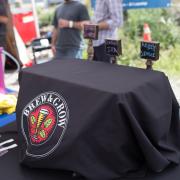Just curious what techniques people use for sparging. I have seen some of us drain the first runnings and add additional sparge water; I have see others of us take the first runnings and throw it back on top of the grain in the tun. Any others? Which provide for maximum efficiency?
Tue, Dec 13, 2011 - 12:12pm
#1
Your Exact Sparge Technique










Hey, thanks for all the replies; and glad I could lure some new people into the conversation!
Just to clarify, you actually need both elevated temperature and pH to extract tannins. This is why we can decoct the mash. The best means to eliminate or drastically reduce tannin extraction is via an acid buffer that will drop the pH of your sparge water. A little lactic acid or 5.2 mash stabilizer will work for this. I don't really recommend adding it to your actual mash, though, as it will precipitate out Calcium that you need for fermentation. By adding to the sparge water, you get the benefit of stabilizing without the loss of Calcium.
As regards decoction mashing, there is a benefit to be gained if you're doing it correctly. It will add additional malt complexity that is different from using a mixed grain bill. I personally prefer this approach. The other benefit is that you can fine tune the fermentable nature of your wort through achieving separate α-Amylase & β-Amylase rests. Recall that α-Amylase will leave longer chain sugars that will result in more body and less fermentable wort. Also note that this does not inherently mean a sweeter beer, but often an increase in perceived sweetness. Just a thought.
Oh, and I batch sparge. Fly-sparging, in my opinion, is more beneficial when you have less space for the sparge or have a huge system.
I know people who fly sparge and have seen them do it. I don't see any point in it at all. Fly sparging works best in breweries, and I think home brewers started doing it just to emulate them. Batch sparging is easier, and does the same thing IMO
Jay,
Great breakdown of the process- that is almost exactly what I do. (You explained it a lot more eloquently than I can)
My only difference is that I split my sparge into two batches. I read somewhere that this was helping to achieve a few more points on average. Can't recall where that was though.
Anyone ever try fly sparging? I've done it once...and I'm sure I did it incorrectly. I think I was fly sparging too fast and extracted a lot of tannins from the grain. I switched to batch sparge and haven't looked back.
I use single infusion batch sparge, and that is just fine for the vast majority of types of beer. I learned on Denny Conn's old batch sparge website back in the day ( http://hbd.org/cascade/dennybrew/ ).
I think you guys are getting batch sparking and fly sparging confused. In fly sparging you don't want your sparge water going over 170F. In batch sparging it is supposed to be higher, but when it is mixed with the grain it should not exceed 170F. For me the sparge water needs to be 188-190F.
Here is my process:
1. Heat strike water. I heat it to 8 degrees over what ProMash (program like beersmith) calculates it to be. This is to preheat the mash tun (cooler). I close it and let it sit for 10 mins, and it should have lost that 8 degrees and be right at my strike temperature. If not I let it sit for a few more minutes. You may need more or less than 8 degrees, find out what is right for your setup.
2. Dough in. Just mix in the grain and make sure you have hit my mash temp. I am almost always within 1-2 degrees of my target. Stir it good!
3. Mash. I let it mash about an hour and probably start heating sparge water 15 mins before the end. I hear that modern 2 row is so modified and has so much enzymes these days almost all conversion is done in 15 mins, and you really only need to mash for 30 mins. I may cut it down from 60mins, but I'm usually not in that much of a hurry.
4. Heat sparge water. 188-190 works right for my system. Our goal is to hit 168-170 after it is mixed in to the mash. There are a lot of factors which will decide whether 188-190 is right for you. Start there and experiment.
5. Start runoff. I vorlauf about a gallon and runoff into the kettle.
6. Sparge. I dump the sparge water in at once, then stir quickly and thoroughly so it all settles in to 168-170F. I let that sit 10 minutes, then stir it up good again.
7. Final runoff. Vorlauf another gallon and runoff into the kettle.
And BTW, consistency is better then efficiency. Mine bounces between 75% and 82% usually.
I add water to my tun to create a grist of around 1.25qt per pound of grain. So if my total grain bill is 10#s my mash water volume is 12.5 quarts or 3.125 gallons. I usually round...so 3 gallons. I mash then open up the valve to drain. I make sure that I collect the first two quarts in a pitcher and pour it back on top of the mash (vorluaf). These first two quarts are full of husk and grain due to the grain bed settling. after about two quarts my mash tun runs fine...I empty the tun and measure what i've collected.
Whatever I collect, I then subtract from my target pre-boil volume to determine what my sparge volume will be. (i.e. if I am targeting 6.5 gallons and collected 2.5 gallons...I'll need 4 gallons more). I usually split the volume in half and do two sparges at 168F....pouring the amount in the tun, stiring, letting the bed settle for 10 mins, open valve, vorlauf 2 qts, and then draining.
combine every running into one pot...boil.
No I never did...well once by accident when I was first brewing I was mashing on the stove and walked away...came back and it was boiling...beer turned out fine though
Decoction really is for unmodified grains...and really was required way back in the day...but today's malts are easily converted..Some people claim it makes a difference while others don't....Basically I think the return on the time you invest is minimal...So I agree with you...
I use BeerSmith, Single infusion, batch sparge.
It tells me what the sparge amount is. After draining off my first runnings I add the amount of sparge water calculated by Beer Smith. I pour it in at 168F and I let it sit for 20 min. then drain it into the boil kettle. Then I add water to get to my boil volume (also calculated by beersmith). I check my boil gravity and make any adjustments.
You can do what Bill says add water and sparge till you get your boil volume. However, you risk extracting more tannins to your wort(especially if pH rises above 6). Additionally sparging with water hotter than 170F will also extract more tannins.
According to How to Brew, page 181, 1.5 times as much water is used for sparging as for mashing.
which can be incorporated into the workshop...
Bill said:
...igz...
Do I smell WORKSHOP?!?!
i must admit im still a little confused on this as well.
...igz...
Yeah, I'd actually like to hit some target numbers, though.